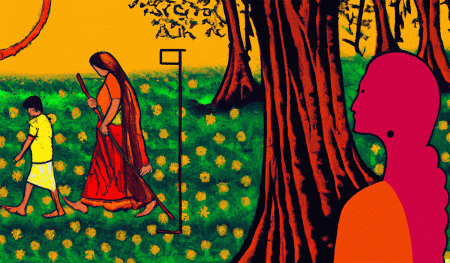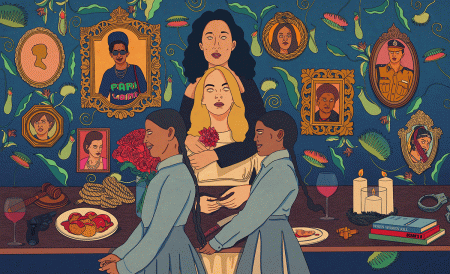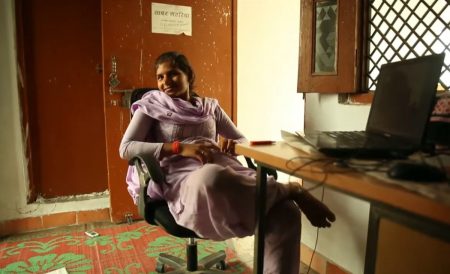I didn’t understand why my grandfather spent an awful amount of time reading Tamil poetry to me if schools were going to punish me for conversing in Tamil. Every day, Thaatha and I sat reading on his creaky bed that was also his storage space for almost everything he owned. A shaving kit with orange razors for which he replaced the blade every month; his diary, cleverly written in writing that was incomprehensible to anyone but him; stacks of paper meticulously arranged and tied with a naada so they stayed in place; his handkerchief that was perpetually dust-stained from cleaning my grandmother’s spectacles; and on the corner of his bed, stacked towards the wall, Tamil books ranging from Kambar, Periyar, Kalki, Jeymohan to Perumal Murugan. My grandfather’s room was a reminder of my home and its eternal struggle with space.
In a middle-class household, space, too, is used frugally. On a busy day, our living room was the kitchen and the bedroom. Limbs moved between walls effortlessly. On days when everything was anything, words offered the comfort of specificity.

Incidentally, the second house we moved to in Chennai was in a ‘posh’ neighbourhood (I learnt later that ‘posh’ was just a sanitised way of saying upper-caste). The roads flanked by houses here came with the suffix ‘Avenue’ as opposed to the ‘Street’ I was used to.
There was a strange sense of exhilaration upon discovering this newfound language. This language was merely an aspiration earlier. I made sure to write my address in capital letters in my school documents lest people mistake it for something else. I had the urge to tell everyone that I too had moved into the city. It didn’t matter that I had in fact lived there for two years.

My friends in the neighbourhood had cooks whereas my mother spent three-fourths of her day in the kitchen; her sari smelled like my favourite mutton curry.
I made active efforts to seal the windows shut when she cooked. I was afraid the smell would turn into a stench the moment it left my house. Keeping it in also meant keeping everything else out.
Eeshwar, my immediate neighbour, had come knocking at my door one afternoon. We were meant to play hide and seek with the others. I quickly exited my house and pulled the door shut before he could even take a peek in. “Let’s go, let’s go, we’re late!” I said, hurrying him away. When the countdown was about to finish, Eeshwar and Nitya turned to me and said, “Let’s hide in your house. Vijay won’t know because he’s never been there!”

As an eight-year-old, I needed friends in the new city. I was terrified of honesty, so I unlearned my home until there was nothing left but the bare bricks of blame and guilt.
As a literature graduate, it’s of no surprise that I strongly believe in the inseparability of the private and the public, but how I came to learn of this coalition is not a very pleasant story.
I spent years keeping my friends away from home in the fear that the lack of space would make them feel uncomfortable. We’re not taught that the fear of discomfort is merely a fear of losing our sense of self. We desire sameness despite its banality because it is comfortable. I thought that to belong in the city I had to practise uniformity and mimic my rich friends even if it meant forgetting and dismissing the space of my home. I resented home and did not forgive my parents for continuing to remember it.

I once again moved to a city for my college, but was surprised to find people settle their discomforts by merely naming them. I was asked if I wanted to go to a Pride parade and upon agreeing, a few friends and I reached the closest metro station. I was told to dress however I wanted to. “But we’re taking public transport, aren’t we?” I said. “So what? If people stare it’s their problem,” a friend retorted. At the metro checking area, I exchanged a quick John Green moment with the guard. “Ladki?” she asked. I nodded and said, “Ladki.” We shared a brief chuckle and I exited from there.
“Why did you laugh?” my friend asked.
“Why not?” I said, puzzled by the question.
“She was trying to misgender you,” she said, concerned.
I smiled and shrugged my shoulders.
I wasn’t sure if I could tell her that being misgendered in a language that wasn’t English felt familiar, comforting even.
Of course, I would have sounded crazy so I kept quiet instead. It is no doubt that queerness is lonely business, but what troubles me perhaps is that we’re still holding onto the aspiration of ‘coming out’. I was asked this by a very close friend recently.
“So, when will you come out to your parents?”
“As what?” I retorted.
My response confused her because her imagination of queerness was in a language that keeps reminding me of my difference. We imagine the queer in English and in doing so seal the periphery shut. What language do we desire in and why must it be translated to be heard?

I spent the first few years in the city resenting my mother for bringing me here. I spent the last few years making sure that none of my friends heard her broken English.





